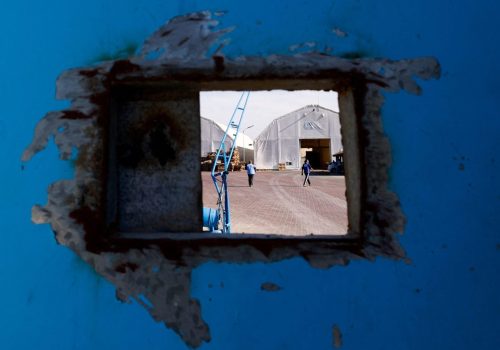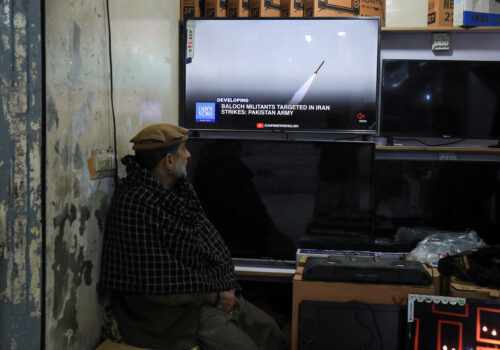Will the US retaliate against Iran after a deadly drone attack?
JUST IN
A new line has been crossed. Iran-backed militias killed three US servicemembers in a drone attack on a base in northeastern Jordan. This is the first time US troops have been killed by enemy fire in the Middle East since the Hamas terrorist attacks of October 7 and Israel’s subsequent war in Gaza, which have led to escalating violence across the region. “We shall respond,” US President Joe Biden said Sunday. But how? Our experts explore what’s next.
TODAY’S EXPERT REACTION COURTESY OF
- William F. Wechsler (@WillWechsler): Senior director of the Rafik Hariri Center and Middle East Programs at the Atlantic Council, and former US deputy assistant secretary of defense
- Jonathan Panikoff (@jpanikoff): Director of the Scowcroft Middle East Security Initiative at the Atlantic Council’s Middle East Program and former US deputy national intelligence officer for the Near East
- Qutaiba Idlbi (@Qidlbi): Nonresident senior fellow with the Atlantic Council’s Rafik Hariri Center and Middle East Programs, where he leads the Syria portfolio
A serious escalation
- Up until now, says Will, US policymakers thought that “the threats from Iran and its proxies and partners were being successfully managed—especially the threats they posed to US forces in the region.” However, with today’s attacks, he says, this thinking has proved false.
- According to Jonathan, the attack “reflects an increased risk tolerance” on Iran’s part in its bid for regional dominance. Syria- and Iraq-based Shia militants aligned with Iran, he adds, “would be unlikely to carry out such an attack without at least the implicit support and approval of senior Islamic Revolutionary Guard Corps (IRGC) leaders.”
- Unlike Iraq and Syria, Jonathan notes, Jordan “is not host to Iran-backed Shia militant bases,” meaning that “this was an attack on not only US forces but also on the Hashemite Kingdom of Jordan, a critical US ally.”
- While the Islamic Resistance in Iraq “claimed the attack was a response to Israel’s war on Gaza,” says Qutaiba, “it is undeniably part of a larger escalation Iranian proxies have been leading against US positions in Syria and Iraq since late 2022.”
Subscribe to Fast Thinking email alerts
Sign up to receive rapid insight in your inbox from Atlantic Council experts on global events as they unfold.

How to hit back
- The United States “will have to respond forcibly to this attack,” says Will, but should ensure that its retaliation minimizes “the risk of provoking a wider regional war or forcing the Iraqi government to formally demand the withdrawal of US troops.”
- To accomplish this, Will argues, the United States could pursue Iranian naval assets, target Houthi leadership, and “comprehensively enforce US sanctions against Iran.” Other options for retaliation include “targeting Iranian—not just proxy—personnel in Syria and eliminating individual IRGC leadership” while they’re traveling abroad, as in the US strike that killed senior IRGC leader Qasem Soleimani in 2020.
- To establish deterrence, Qutaiba says,“the United States could deliver a strategic blow to Iran’s capabilities in Eastern Syria, upending the strategic Iraq-Syria-Lebanon land corridor.” Such an approach, he argues, “may prove beneficial to US positioning in the region, to regional allies, and to many of the region’s chronic conflicts in Syria and Lebanon.”
- While US policy so far has been to avoid retaliation against Iran in a way that could spark a region-wide war, says Jonathan, the Biden administration must “decide whether hostilities have now crossed the Rubicon and the United States is already in a regional conflict.”
Further reading
Tue, Oct 24, 2023
The global consequences of the Israel-Hamas war are just beginning. Here’s what to watch.
The Big Story By Kirsten Fontenrose
It's hard to predict what decisions the players will make tomorrow, but here are the early warning signs that could indicate what will come next in the Middle East and beyond.
Sun, Jan 28, 2024
Experts react: Three US servicemembers were killed in Jordan. Will the US strike back at Iran?
New Atlanticist By
More than 150 attacks on US forces in the Middle East have occurred since October 2023, but the strike overnight was the first to kill a US soldier.
Thu, Jan 18, 2024
Experts react: What’s really going on with Pakistan and Iran exchanging attacks?
New Atlanticist By
Pakistan just conducted airstrikes in southeastern Iran, two days after Iran used missiles and drones to strike western Pakistan. Atlantic Council experts explain what’s going on.
Image: Satellite view of the U.S. military outpost known as Tower 22, in Rukban, Rwaished District, Jordan October 12, 2023 in this handout image. Planet Labs PBC/Handout via REUTERS


